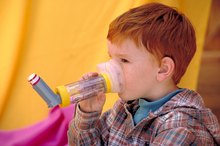Bad Side Effects of Mucinex
Mucinex, whose generic name is guaifenesin, loosens up phlegm or mucus in your chest and throat, making it easier to cough it out 5. The expectorant is used to treat congestion due to infection, allergies or colds. Many different versions of medications contain the active ingredient guaifenesin, and sometimes guaifenesin is found in combination with antihistamines, cough suppressants or decongestants 5. It’s important to note that any other drugs used in combination with guaifenesin can have side effects themselves, but the side effects associated with guaifenesin itself might include nausea, dizziness or drowsiness, or rash 5.
If you are experiencing serious medical symptoms, seek emergency treatment immediately.
Stomach Problems
Mucinex is generally very well tolerated. In fact, according to the Merck Manual Professional Version, guaifenesin is the most commonly used expectorant because “it has no serious adverse effects.” However, mild and infrequent side effects have been reported 15. The most common side effects are nausea or stomach upset and vomiting. Stomach pain and diarrhea have also been reported.
- Mucinex is generally very well tolerated.
- The most common side effects are nausea or stomach upset and vomiting.
Problems Related to the Nervous System
How Does Mucinex Work?
Learn More
Side effects involving the nervous system are sometimes seen in people taking guaifenesin 5. These include dizziness, drowsiness and headache. In a clinical study published in "Respiratory Research" in 2012, only about 3 percent of patients reported any kind of nervous system side effect, and the authors deemed this likely not due to the medication.
Skin Rash
A rash is an even more rare side effect, but it sometimes occurs in people taking guaifenesin 5. The skin irritation can sometimes include hives.
Other Side Effects
Alternatives to Spiriva
Learn More
There have been a few, extremely rare cases of guaifenesin producing other side effects, but these are often in cases where a combination drug was used and, in some cases, abused 5. Guaifenesin is sometimes paired with either ephedrine or dextromethorphan, which have been known to be abused by young people 5. A few cases have reported kidney problems such as stones formed of guaifenesin when overused 5.
Warnings
While Mucinex is generally very safe for most people, if you experience any signs of an allergic reaction, seek immediate medical attention. These include hives, difficulty breathing or swelling, particularly of the throat, lips, tongue or face. The safety of guaifenesin for pregnant or nursing mothers has not been determined, so you should consult your physician about this before using the drug 5. Also, if you have a cough or cold that has persisted for more than a week, it is time to see your doctor.
- While Mucinex is generally very safe for most people, if you experience any signs of an allergic reaction, seek immediate medical attention.
Related Articles
References
- Merck Manual Professional Version: Cough in Adults
- Respiratory Research: Patient-Reported Outcomes to Assess the Efficacy of Extended-Release Guaifenesin for the Treatment of Acute Respiratory Tract Infection Symptoms
- Canadian Journal of Urology: Acute Bilateral Ureteral Obstruction Secondary to Guaifenesin Toxicity
- Journal of Emergency Medicine: Acute Renal Failure After Ingestion of Guaifenesin and Dextromethorphan
- Drugs.com: Guaifenesin
- RXList: Organidin NR
- Guaifenesin. Drugs.com website. Updated November 14, 2010.
- Guaifenesin. Medline Plus website. Updated July 15, 2017.
- Guaifenesin (Oral Route). PubMed Health website. Updated October 1, 2017.
- Rubin, BK. (2017). Mucolytics, Expectorants, and Mucokinetic Medications. Respiratory Care. 52:7, 859.
Writer Bio
Doug Dohrman earned a Ph.D. in neuroscience from the University of Iowa. Following post-doctoral training at UCSF, he directed courses in neuroscience and histology for first year medical students and has also taught in anatomy, physiology and biostatistics. His research background is in cell and molecular biology and he is currently involved with medical editing/writing.









